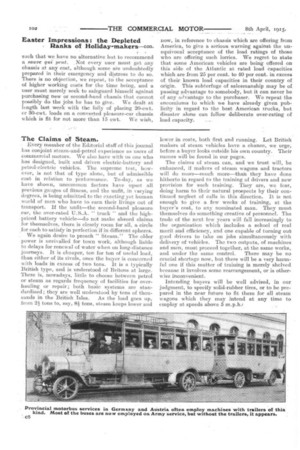The Claims of Steam.
Page 2

If you've noticed an error in this article please click here to report it so we can fix it.
Every member of the Editorial staff of this journal has conjoint steam-and-petrol experience as users of commercial motors. We. also have with us one who has designed, built and driven electric-battery and petrol-electric vehicles. The supreme test, however, is not that of type alone, but of admissible cost in relation to performance. TG-day, as we have shown, uncommon factors have upset all previous gauges of fitness, and the unfit, in varying degrees, is being .admitted to the. exacting yet human ,world of men who have to earn their livings out of transport. If the unfit—the second-hand pleasure .ear, the over-rated " truck " and the highpriced battery vehicle—do not make absurd claims for themselves, there. is clearly room for all, a circle , for each to satisfy in perfection if in different spheres. . We again desire to preach " Steam." The (eider power is unrivalled for town work, although liable to delays for renewal of water when on long-distance journeys. It is cheaper, ton for ton of useful load, than either of its rivals, once the buyer is concerned with loads in excess of two tons. It is a typically British type, and is understood of Britons at large. There is, nowadays, little to choose between petrol or steam as regards frequency of facilities for overhauling or repair; both basic systems are standardized; they are well understood by tens of thousands in the British Isles. As the load goes up, from 2i tons to, say, 8 tons, steam keeps lower and lower in costs, both first and running. Let British makers of steam vehicles have a chance, we urge-, before a. buyer looks outside his own country. Their names will be found in Our pages.
The claims of steam can, and we trust will, be enhanced, if makers of steam wagons and tractors will do more—much more—than they have done hitherto in regard to the training of drivers and new provision for such training. They are, we fear, doing harm to their natural prospects by their continued neglect of calls in this direction. It is not enough to give a few weeks of training, at the buyer's cost, to any nominated man. They must themselves do something creative of personnel. The trade of the next few years will fall increasingly to the organization which includes a school of real merit and efficiency, and one capable of turning out good drivers to take on jobs simultaneously with delivery of vehieles. The two outputs, of machines and men, must proceed together, at the same works, and under the same control. There may be no crucial shortage now, but there will be a very harmful one if this matter of training is merely shelved bemuse it involves some rearrangement,. or is otherwise inconvenient.
Intending buyers will be well advised, in our judgment, to specify solid-rubber tires, or to be prepared in the near future to fit them for all steam wagons which they may intend at any time to employ at speeds above 5 m.p.h.




















